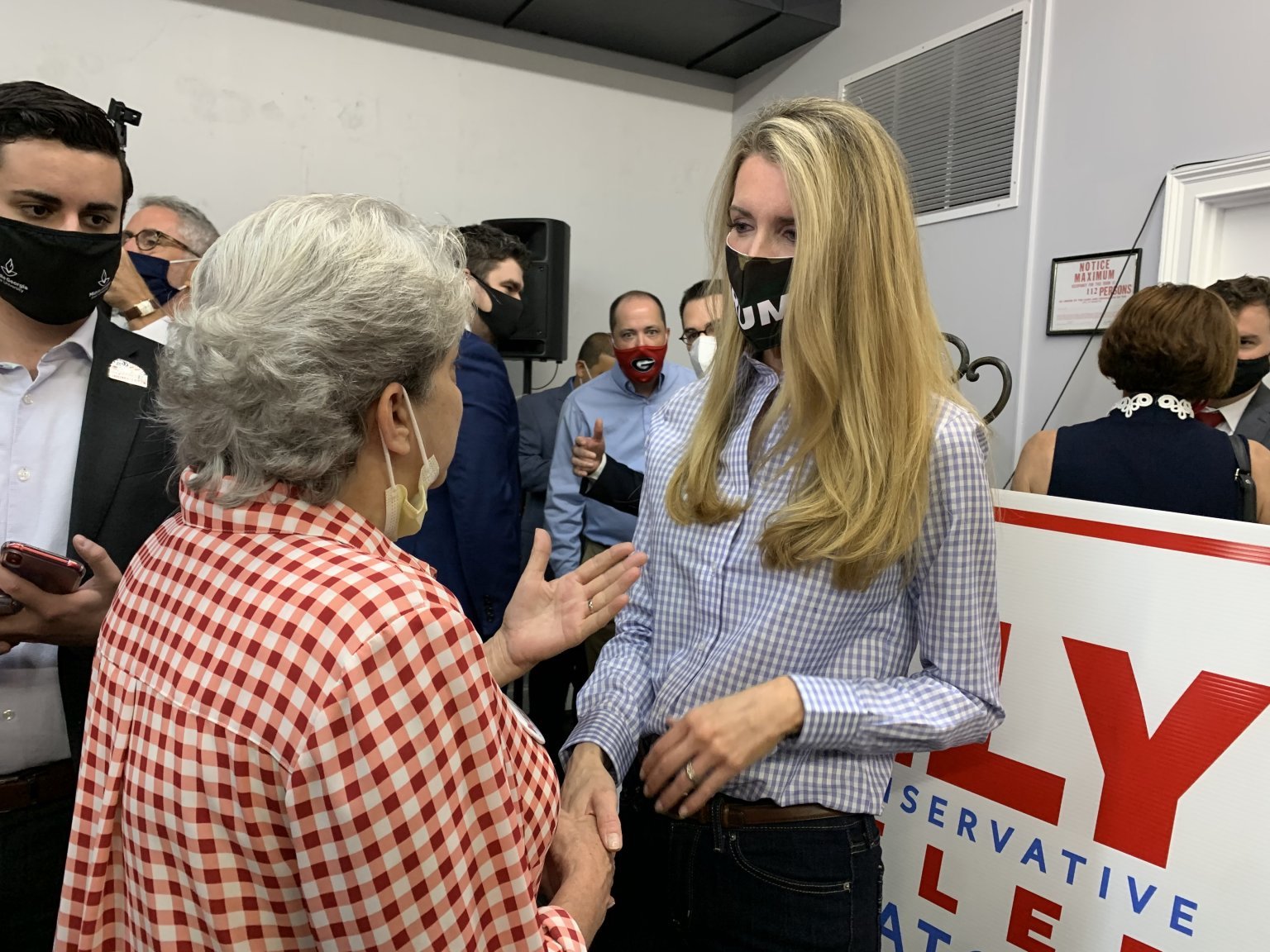
WASHINGTON — Two key Republican senators indicated Monday they won’t stand in the way of a furious effort by the Senate GOP to confirm a nominee to fill a Supreme Court vacancy before Inauguration Day.
Iowa Sen. Chuck Grassley ended the suspense with a statement Monday night saying there’s no “ambiguity” about what direction for the high court Americans wanted when they voted for President Donald Trump four years ago.
And Colorado Sen. Cory Gardner, who’s in a tough reelection battle, said a short time later that he also would let the confirmation process move forward, saying in a statement posted to Twitter that he would vote to confirm a “qualified nominee” who is tapped by Trump.
Had Grassley or Gardner joined two other GOP senators in opposing a vote on a nominee, it would have left Senate GOP Leader Mitch McConnell with an even slimmer margin to win confirmation for the replacement for Justice Ruth Bader Ginsburg. Republicans Susan Collins of Maine and Lisa Murkowski of Alaska have already said the winner of the presidential election should choose the next justice.
McConnell (R-Ky.) pledged Friday to hold a confirmation vote on the Senate floor, but it’s unclear whether he has enough support to do so this year. He also did not specify whether the vote would come before or after the November election.
Grassley said in July that if a Supreme Court justice died this year, he as Judiciary Committee chairman would not hold a hearing on a new nominee because he did not do so in a similar situation in 2016. He is no longer chairman but was four years ago when President Barack Obama unsuccessfully sought the confirmation of Judge Merrick Garland to succeed the late Justice Antonin Scalia.
“Over the years, and as recently as July, I’ve consistently said that taking up and evaluating a nominee in 2020 would be a decision for the current chairman of the Judiciary Committee and the Senate Majority Leader,” Grassley said in his Monday statement.
“Both have confirmed their intentions to move forward, so that’s what will happen. Once the hearings are underway, it’s my responsibility to evaluate the nominee on the merits, just as I always have. The Constitution gives the Senate that authority, and the American people’s voices in the most recent election couldn’t be clearer. While there was ambiguity about the American people’s will for the direction of the Supreme Court in 2016 under a divided government, there is no such ambiguity in 2020.”
Gardner said that when a president makes a nomination, it’s up to the Senate to decide how to proceed with its duty of advice and consent. “I have and will continue to support judicial nominees who will protect our Constitution, not legislate from the bench, and uphold the law. Should a qualified nominee who meets this criteria be put forward, I will vote to confirm,” he said.
Georgia’s two Republican senators back McConnell’s plan to move quickly on Trump’s nominee, with both David Perdue and Kelly Loeffler of Georgia confirming their support over the weekend.
During a Fox News interview Saturday, Loeffler argued that the Constitution allows Trump to pick a nominee for a Senate vote. “We need to keep that process moving regardless of it being an election year,” she said.
Perdue said Sunday that he would support the president’s nomination, according to the Atlanta Journal-Constitution.
On Monday, Trump announced he was considering five women to fill the seat left vacant by the death of Ginsburg, an icon of the left who was appointed by President Bill Clinton in 1993. Trump said he would “probably” announce his pick on Saturday and said he hopes the vote will take place before the election. Ginsburg, however, according to her granddaughter, said before her death that it was her “most fervent wish” to not be replaced before Inauguration Day.
Nominees to the high court need a simple majority to win confirmation.
Republicans control 53 seats in the Senate. Opposition from Collins and Murkowski leaves Trump and McConnell with a maximum possibility of 51 GOP votes if the nominee were to come to the Senate floor before Election Day. If they lost another, that would mean Vice President Mike Pence most likely would cast a tie-breaking vote in favor of the nominee.
Trump and McConnell could lose yet another vote in support of confirmation this year if Arizona’s McSally loses her special election contest against former astronaut Mark Kelly, a Democrat. If Kelly wins, he could take office as early as Nov. 30, giving Democrats a key vote against Trump’s nominee and possibly enough votes to block confirmation.
Senate Judiciary Chair Lindsey Graham (R-S.C.) came out in strong opposition to confirming a Supreme Court nominee in an election year in 2016 but changed his tune this year. “I will support President @realDonaldTrump in any effort to move forward,” he tweeted this weekend.
Other GOP senators have not made their views known publicly.
Senate Democrats, on the other hand, are calling on McConnell to postpone the vote until after Inauguration Day. Doing otherwise, they said, would be a raw power grab that would heighten acrimony in the already bitterly divided chamber and escalate pitched partisan warfare.
“And by all rights, by every modicum of decency and honor, Leader McConnell and the Republican Senate majority have no right to fill it. No right,” Senate Minority Leader Chuck Schumer (D-N.Y.) said Monday.
Republicans, however, charge Democrats with hypocrisy, given that many in 2016 said open seats on the high court should be filled in election years but are now arguing they should not.
Vulnerable senators
Iowa Republican Joni Ernst is another senator in a fight to keep a seat, and in July said she would back a Supreme Court appointment before a new president is seated even if Trump lost his bid for reelection, according to The Des Moines Register. A freshman who sits on the Judiciary Committee, Ernst took the opposite view in 2016.
“We have much to consider over the coming days. The Supreme Court plays a fundamental role in the defense of our Constitution and in the protection of our rights and liberties. Once the president puts forward his nominee for the Supreme Court, I will carry out my duty—as a member of the Senate Judiciary Committee—to evaluate the nominee for our nation’s highest court,” Ernst said Monday.
North Carolina’s Tillis also backs a vote this year. He announced his position by echoing McConnell’s defense of his reversal. In 2016, control of the Senate and the White House was divided; this year, it’s not, McConnell said in a statement Friday.
“Four years ago, a Supreme Court vacancy arose under divided government and a lame-duck president as Americans were choosing his successor,” Tillis said in a statement Saturday. “Today, however, President Trump is again facing voters at the ballot box and North Carolinians will ultimately render their judgment on his presidency and how he chooses to fill the vacancy.”
A Democratic senator on the ballot in November, Sen. Doug Jones (D-Ala.), called the decision to nominate a new justice “wrong” and “disturbing.”
“It is unconscionable that Sen. McConnell and the majority leadership position will allow him to go forward and push through a nomination to the United States Supreme Court,” Jones said during a virtual campaign event on Facebook.
In Maine, Collins — also among her party’s most vulnerable members — said in a statement that she wouldn’t object if the Senate Judiciary Committee began the confirmation process but said the chamber shouldn’t vote before Election Day.
“We must act fairly and consistently, no matter which political party is in power,” she said, adding that the decision should be made by the president who is elected this fall.
RELATED
Trump says he’ll announce Supreme Court pick by Friday or Saturday







